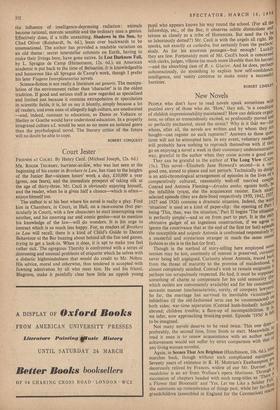Court Jester
FRIENDS AT Coma. By Henry Cecil. (Michael Joseph, 12s. 6d.) MR. ROGER THURSBY, barrister-at-law, who was last seen at the beginning of his career in Brothers in Law, has risen to the heights of the Junior Bar—sixteen hours' work a day, £10,000 a year (gross, one fears), and the immediate prospect of taking silk at the age of thirty-three. Mr. Cecil is obviously enjoying himself, and the reader, when he is given half a chance—which is often— enjoys himself too.
The author is at his best where his novel is really a play. Find him in Chambers, in Court, in Hall, on a race-course (but par- ticularly in Court), with a few characters to start interrupting one another, and his unerring ear and comic genius—not to mention his knowledge of the law—will do wonders. It is his urge to instruct which is so much less happy. For, as readers of Brothers in Law will recall, there is a kind of Child's Guide to Decent Behaviour at the Bar buzzing about behind all the fun and games, trying to get a look-in. When it does, it is apt to make you feel rather sick. The egregious Thursby is confronted with a series of distressing and unusual problems of etiquette which he solves with a didactic highmindedness that would do credit to Mr. Nehru. His advice, moral and otherwise, thus tendered is accepted with fawning admiration by all who meet him. He and his friend, Blagrove, make it painfully clear how little an uppish young pupil who appears knows his way round the school. (For all the fellowship, etc., of the Bar, it observes subtle distinctions and taboos as closely as a tribe of Hottentots. But need the i's be so laboriously dotted?) Mr. Cecil is with the angels all right. He speaks, not exactly ex cathedra, but certainly from the prefects' study. As for his amorous passages—but enough! Luckily they are few. Fortunately most of Mr. Cecil's book is concerned with clerks, judges, villains (so much more likeable than his heroes) —and the absorbing case of R. v. Glacier. And he does, perhaps subconsciously, do something to explain how self-confidence, intelligence, and vanity continue to make many a successful barrister.
ROBERT LINDLEY


































 Previous page
Previous page